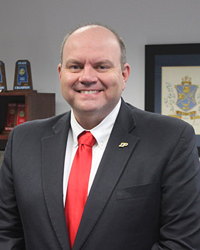In Doris Kearns Goodwin’s book Team of Rivals, President Abraham Lincoln is described as being the master of setting aside political and personal differences and including opposing voices in his cabinet. In an era of political chaos, that model of leadership is lacking in many arenas of policymaking and discourse, and as public school leaders, we often wonder why policymakers make decisions that may seem counter to what we believe is the correct course of action on issues such as school funding, mental health, racial equality, and more.
I believe the best way to address this is by building relationships with our elected officials and candidates at all levels of government. Here are some steps I have found to be helpful.
Be willing to listen, discuss, advocate, and cooperate with elected officials. It may seem foreign to us since we see them on TV or in advertisements, but politicians are just like you and me. They have families, financial problems, leaks at their house, dogs that need to be walked, and all the messiness of life. But somewhere along the way, just as you had that spark that kindled your interest in teaching, they had a spark that kindled their interest to run for office and serve.
Get to know your elected officials personally, and help them get to know you personally.
How do you do that? You invite them to your school’s sporting events. Recognize them before the game with a plaque or school shirt for their willingness to fight for issues where you share common ground. Give them public praise. And then invite them to sit with you during the game; have them bring their spouse, and introduce them to your spouse. While watching the game, mix in shop talk while learning more about who they are as a person. If you don’t know what to say to them, the late Larry King wrote a masterful book entitled, How to Talk to Anyone, Anytime, Anywhere.
During election years, you also can invite candidates to your school to tour and talk to classes. Early in the primary season, I invite candidates from both parties to come to our school to learn how we are educating our students, see the campus, and discuss data, and I let them know that I am available in the future to discuss educational issues. When they visit, we inform the community that the candidate has been at the school through our school call to parents and social media. I want candidates running for office to see what we have been doing at my school and use it as a reference point when they are speaking and deciding on educational policy.

Which candidates for office should you invite? Invite them all. You never know if the local judge will one day decide to run for the legislature or if the constable will decide to run for mayor. Build a relationship with each candidate at all levels.
Once you have established that relationship, it’s okay to contact them to advocate for your issues, but it’s also important to contact them just to thank them for their willingness to serve, check up on how they are doing, and give them praise. When you visit them at their office at the courthouse or the capitol, take a school pennant or hat and present it to them as a token of your appreciation. The public official will usually display it in their office for everyone else to see.
Data also matters. Share with your elected officials the data that shows their investment in your school is producing results. Many political leaders are business leaders, and they want to see a return on their investment.
If they don’t support your side of an issue all the time, don’t sever the relationship. My spouse and I don’t always see eye to eye, but we know that we still have to work together for the good of the relationship. Ask questions to understand their point of view. Make your points politely and respectfully. If necessary, move on to another issue and agree to disagree on that issue.
Speaker Tip O’Neill said it best when he said, “All politics is local.” So make it local. From your U.S. Representative to your local elected officials, make them think of your school when they are deciding on public education, and about you and your teachers when they are voting on salaries.
There is no time like the present to reach out, build a relationship with your elected officials, and create a “team” that works for your school and your community.


1 Comment
Well said Adam. Your thoughts are a timely reminder of the importance of making these relationships a priority. Thank you for sharing this with us.